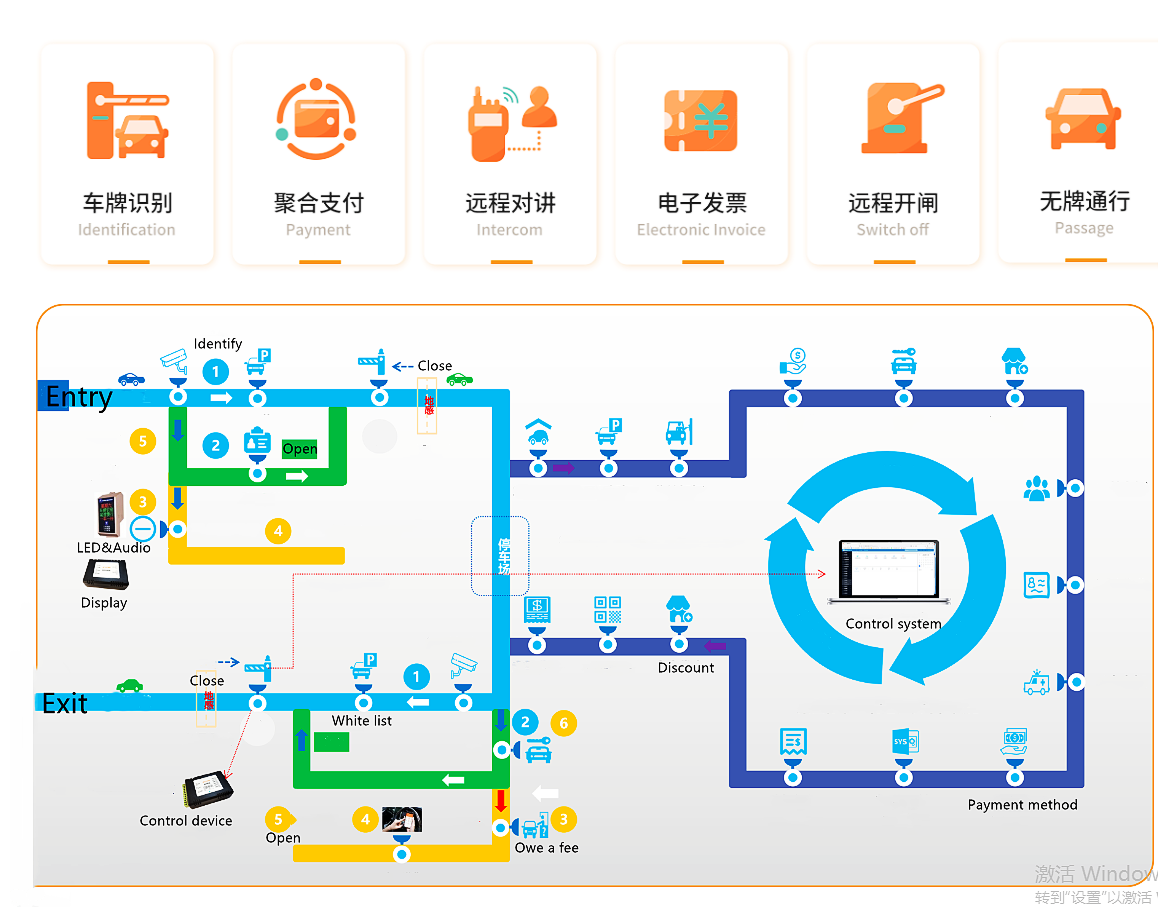Revolutionizing Parking with RFID Technology: Smart Parking Systems
Introduction:
Parking woes have long been a source of frustration for drivers in bustling urban areas. However, advancements in technology, particularly the utilization of Radio Frequency Identification (RFID), have led to the development of efficient and convenient smart parking systems. These systems leverage RFID technology to streamline parking processes, optimize space utilization, and enhance the overall parking experience for both drivers and parking operators. In this article, we will explore the application of RFID in smart parking systems and the benefits they offer.
1. RFID Technology Overview:
RFID technology uses radio waves to wirelessly identify and track objects equipped with RFID tags. These tags consist of a microchip that stores data and an antenna for communication. RFID systems typically comprise three components: RFID tags, RFID readers, and a backend management system. The tags can be passive (powered by the reader's electromagnetic field) or active (with an onboard power source).
2. How RFID Enhances Smart Parking Systems:
a. Automated Vehicle Identification: RFID tags can be affixed to vehicles, enabling seamless identification and entry into parking facilities. As a vehicle approaches the entrance, the RFID reader captures the tag's unique identifier, allowing for swift access without the need for physical tickets or access cards.The common practice is to identify vehicles by their license plate numbers
b. Real-time Parking Space Monitoring: RFID sensors embedded in parking spaces detect the presence or absence of vehicles. This information is relayed to the central management system, providing real-time data on available parking spaces. Drivers can access this information through mobile apps or digital signage, enabling them to quickly locate vacant spots and reduce unnecessary circling.For example, you may have seen vacant parking spaces with green lights hanging as an indication.
c. Contactless Payment and Exit: RFID tags linked to a driver's payment account enable cashless transactions. As a vehicle exits the parking area, the RFID reader records the departure time and automatically deducts the appropriate parking fee from the driver's account. This eliminates the need for manual ticket validation and payment, reducing congestion and enhancing the overall parking experience.At this moment, we have to commend the greatness of PayPal, Alipay, and WeChat Pay.
d. Enhanced Security and Control: RFID technology enables secure access control, preventing unauthorized entry to parking facilities. Additionally, the system can generate alerts in case of suspicious activities or unauthorized vehicle access, enhancing overall security measures.
e. Data Analytics and Optimization: The wealth of data collected by RFID-enabled smart parking systems can be analyzed to optimize parking operations. Insights such as peak usage hours, parking duration patterns, and traffic flow can help parking operators make informed decisions regarding pricing, resource allocation, and infrastructure improvements.
A smart parking system typically consists of various devices and components working together to manage and optimize parking operations. Here are some common devices found in a smart parking system:
sensors, RFID readers, Payment Kiosks ,Display Panels and Signage,Mobile Applications,Backend Management System,CCTV Cameras: Data Analytics Tools.
It's important to note that the specific devices used in a smart parking system can vary depending on the implementation and requirements of each system.Of course, the accuracy and quality of these devices also impact the user experience for customers. Such as In an RFID reader, the crystal resonator is typically used in the reader's oscillator circuit. It provides a stable clock signal that regulates the timing and synchronization of the reader's operations, including communication with RFID tags.
The crystal resonator effect ensures that the RFID reader operates at a consistent and accurate frequency, which is essential for reliable communication with RFID tags. It helps maintain the integrity of the communication protocol, ensuring that the reader can accurately transmit and receive data from the tags.
By leveraging the precise frequency generated by the crystal resonator, RFID readers can achieve reliable and efficient performance, enhancing the overall effectiveness of the RFID system.
Frequency stability of crystal : A crystal resonator with a tighter tolerance offers higher accuracy in generating the desired frequency. This accuracy is crucial in RFID readers, as it ensures precise timing and synchronization for reliable communication with RFID tags.More information check this article.
What is the most accurate crystal oscillators?
3.Benefits of RFID-based Smart Parking Systems:
a. Time and Cost Savings: RFID technology enables faster and smoother parking processes, reducing the time spent searching for parking spaces and facilitating quicker entry and exit. This improves traffic flow, minimizes congestion, and saves fuel costs.
b. Improved User Experience: Drivers benefit from a seamless parking experience with reduced hassle, contactless payments, and real-time information on available spaces. This convenience enhances overall satisfaction and encourages repeat usage.
c. Optimal Space Utilization: By monitoring parking space occupancy in real-time, RFID-based systems maximize space utilization, minimizing underutilized or vacant spots. This efficiency helps parking operators make the most of limited parking resources.
d. Environmental Impact: Efficient parking systems contribute to reduced traffic congestion and lower carbon emissions. By minimizing the time spent searching for parking, RFID-based solutions support sustainability initiatives and promote greener transportation practices.
Conclusion:
RFID technology has revolutionized parking management with its application in smart parking systems. Through automated vehicle identification, real-time monitoring, contactless payments, enhanced security, and data analytics, RFID-based solutions offer numerous benefits to both drivers and parking operators. As urban areas continue to face parking challenges, the adoption of RFID technology in smart parking systems holds the promise of efficient and seamless parking experiences, transforming the way we park our vehicles in the modern world.

